BEHOLD
THE 2025 FLY CONVENTION


usually tend to think of multitasking as a skill, somewhat like a superhero’s special power that ensures that all the checklists are completed before the time runs out. And while it’s necessary to some extent, if I’m honest, I feel the strain of distraction with each new notification that chimes and reminder of my to-do list.
If you’ve ever found yourself wearied by the frenzied pace that life can take on, you know that empty feeling. But imagine for a moment the opposite end of that continuum, where choosing one single, supreme focus of our attention brings peace and security. This stark contrast was on full display at the recent 2025 FLY Convention, making lasting change in the hearts of many.
Around 1,500 youth, dorm room leaders, youth leaders, skilled volunteers, invested adults, and families joined together at the YMCA of the Rockies in Estes Park, Colo., for a mountaintop experience of beholding Jesus Christ. This year’s theme, based on John 1:29, “Behold, the Lamb of God, who takes away the sin of the world,” provided the opportunity to put down our distractions and focus on the only One worthy of our attention.
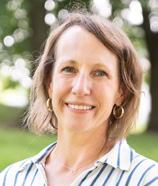
In the current cultural context, our youth are daily pressured to be relevant, liked, and followed. To look inward for self-worth and outward for approval. The solid slate of speakers pointed us away from those dead ends and instead toward the only true source of freedom—Jesus Christ. From morning Bible studies and electives to evening speakers and worship, we soaked up the living, eternal Word of God. Collectively, hearts responded to the invitation to look up, to put down the distractions, and behold our Savior.
As a parent, I was stilled and grateful to see Jesus pursue not only my children but a thousand others. Helping our teens navigate the world in which we live can be daunting. Yet when I see our youth leaders and volunteers giving up their vacation days to pour into these youth, I’m reminded we’re not alone. Even better, watching our Savior relentlessly seek the hearts of our youth is a kind of refreshing you just can’t get anywhere else.
As a passionate supporter of the Church, and particularly our AFLC, I am confident that this generation of youth is already making a huge impact in our communities. They are an integral part of our free, living, and Lutheran body of believers! Investing in our youth is never a wasted effort.
My words fall short in portraying how awe-inspiring the 2025 FLY Convention was. But thankfully, our talented media team captured moments and stories that we are excited to share with you in this issue. As you enjoy the beauty in the pages ahead, I hope that you are inspired by what the Lord is doing in the hearts of our youth.
—Monica Coyle, editorial board member
THE LUTHERAN AMBASSADOR
SEPTEMBER 2025
VOL. 63 NO. 9
Editor
Pastor Andrew Kneeland laeditor@aflc.org
Managing Editor Ruth Gunderson ruthg@aflc.org
Circulation
Liz McCarlson lasubscriptions@aflc.org
Editorial Board
Monica Coyle
Pastor Craig Johnson Pastor Jerry Moan
The Lutheran Ambassador (ISSN 0746-3413) (USPS 588-620) is published monthly by the Association of Free Lutheran Congregations, 3110 E. Medicine Lake Blvd., Plymouth, MN 55441 Phone (763) 545-5631 Periodicals postage paid at St. Paul, MN and additional mailing offices. Postmaster send address changes to The Lutheran Ambassador, 3110 E. Medicine Lake Blvd., Plymouth, MN 55441.
subscriptions & giving
The Lutheran Ambassador is a free publication of the AFLC. Our non-profit ministry is supported by readers’ gifts. To subscribe and give online, visit our website aflc.org/lutheran-ambassador
Checks may be mailed to 3110 E. Medicine Lake Blvd., Plymouth, MN 55441
Email inquiries can be sent to lasubscriptions@aflc.org
And the angel said to them, “Fear not, for behold, I bring you good news of great joy that will be for all the people.”
[Luke 2:10]
Behold, I stand at the door and knock. If anyone hears my voice and opens the door, I will come in to him and eat with him, and he with me.
[Revelation
3:20]
And I heard a loud voice from the throne saying, “Behold, the dwelling place of God is with man. He will dwell with them, and they will be his people, and God himself will be with them as their God.”
[Revelation 21:3–4]
Behold, the eye of the Lord is on those who fear him, on those who hope in his steadfast love.
[Psalms 33:18]
Go therefore and make disciples of all nations, baptizing them in the name of the Father and of the Son and of the Holy Spirit, teaching them to observe all that I have commanded you. And behold, I am with you always, to the end of the age.
[Matthew 28:19–20]
By Pastor Andrew Kneeland
Young people today are exposed to more images, messages, and advertisements in one week than previous generations likely saw over many years. Competing visions of a successful life, endless and constant advertising, idealized and caricatured lifestyles—the world aggressively pursues the eyes and attention of our youth. But the speakers and teachers at the FLY Convention gave students the chance to behold something different: Christ, and him crucified.
The 2025 Free Lutheran Youth Convention was held June 30–July 4, 2025, at the YMCA of the Rockies in Estes Park, Colo. The theme of the convention was “Behold,” taken from John 1:29: “Behold, the Lamb of God, who takes away the sin of the world!”
Dr. Nathan Olson (Savage, Minn.) spoke in the opening session on Monday evening, framing the rest of the week by introducing the theme. “Our world desires to put things in front of you,” he shared. “But God’s invitation from his Word is to let all those things fade away and come behold the glory of God.”
Against the beautiful backdrop of the Rocky Mountains, nearly 1,400 students and adults heard of the glory, power, and mercy of Jesus. Evening sessions, elective and workshop times, and even the hiking and recreation opportunities through the week all gave students the chance to behold Jesus.
Matt Monseth (Plymouth, Minn.) preached on Tuesday evening. He walked students through the Old Testament practice of animal sacrifices that pointed to the perfect sacrifice of Christ, the Lamb of God who takes away the sin of the world. “There is no more wrath to be poured out on those who are in Christ Jesus!” he told the students. Each morning, Keith Ferrin led the students in Bible Hour. The Seattle-based speaker and storyteller invited students to behold the power of God’s Word. He taught that Scripture is not like any other book but is living and active. “Believing something is true and believing something is alive are two very different things,” Ferrin said. “The living Word of God is a reality, not a phrase.” Rather than reading the Bible informationally, Ferrin encouraged students to read relationally. He presented the Book of Jonah and portions of the Gospel of John from memory to show the beauty and timeless relevance of Scripture.
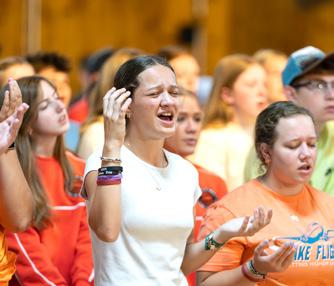


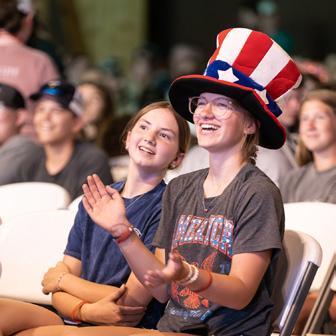
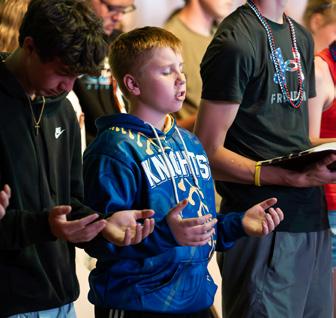

BEHOLD THE 2025 FLY CONVENTION
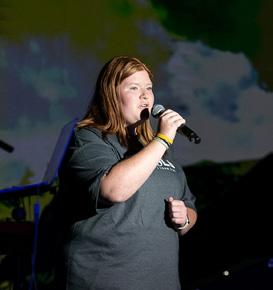
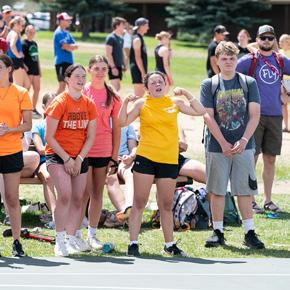



The Wednesday message focused on the transforming power of the Lord’s glory. Pastor Scott Stroud (Lake Stevens, Wash.) shared his testimony and encouraged students with the power of the Holy Spirit. Stroud painted a picture of a ship being rowed against a strong current compared to a ship that sails in the wind. Showing the spiritual weakness of our efforts and abilities, he said, “What if instead of beating yourself up for not being strong enough, smart enough, or talented enough, you set the sail … and let the strong and steady wind of the Spirit move you toward your destination?”
To address several issues relevant to a teenager’s life, students also attended a rotation of three workshop hours during the mornings of the convention. Pastor Andy Coyle led a session on truth, striving to help students sift through the massive quantity of information they encounter daily and determine whom to trust and where to go for answers. Tiger McLuen tackled the theodicy issue for youth in a session entitled, “If God is Good, Why is Life so Hard?” Looking to Matthew 7, McLuen said, “Both the house built on the sand and the house built on the rock are hit by the storm. (Jesus) is the rock in the midst of the storm, not the rescue from the storm.” And as the third workshop offering, Dr. Jason Holt interviewed four panelists from different vocations. They shared about how God’s kingdom is served in diverse callings, including airline pilot, stay-at-home parent, and professional window cleaner. Students were encouraged that they can serve God no matter their stage of life or vocation.
On Thursday night, Pastor Eric Westlake (Zumbrota, Minn.) shared the story of Lazarus. He pointed to the life-creating power of Jesus’ words and called students to repent and believe the gospel. Youth groups gathered on Thursday evening to reflect on the week.
The elective opportunities were also a highlight of the week. The FLY Committee put together a lineup of 30 sessions addressing issues and topics the students regularly encounter, such as anxiety, relationships, and technology. Other electives were taught on topics like the Holy Spirit, prayer, and confession and absolution. Students could attend four of these electives through the week, but each session was recorded and will be




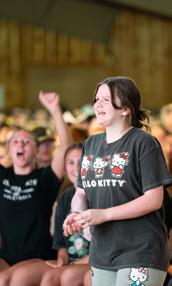



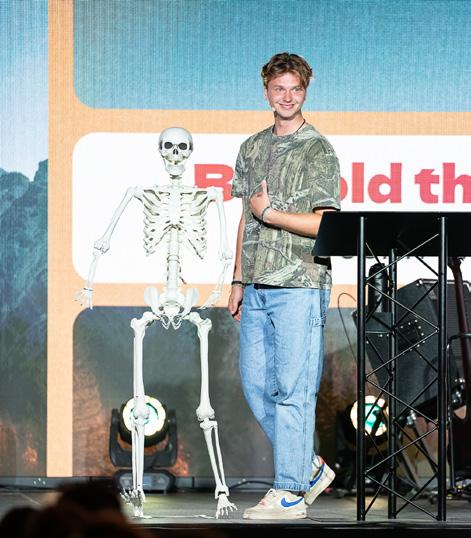
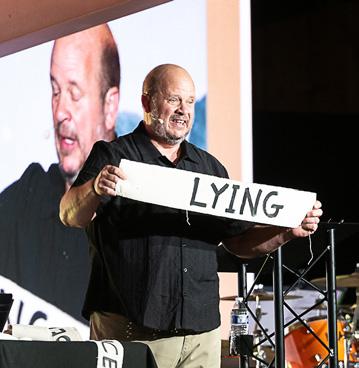

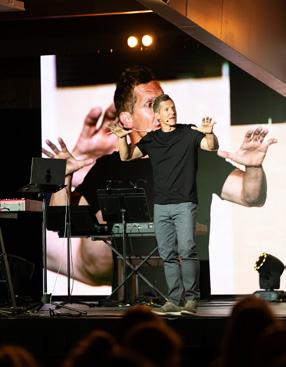
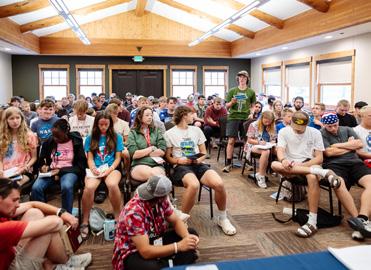


available on the FLY Convention website.
And finally, Pastor Ben Sollie (Minneapolis, Minn.) encouraged students on Friday evening with Christ’s words in the Great Commission. As they leave Estes Park, they can live out their calling with confidence because of Christ’s promise to be with them always, to the end of the age.
The afternoons on the campus of the YMCA of the Rockies were open for rest and recreation. Hundreds of students participated in basketball, volleyball, and ultimate Frisbee tournaments. There were art opportunities, board games, a talent show, and hiking trails available during the afternoons. Three national acts also performed during the week, including comedian Shama Mrema, musician Cade Thompson, and the improv group 321 Improv.
The 2025 FLY Committee included Pastor Ryan Patenaude, Alex Monseth, Ignacio Dávalos, Ruth Gunderson, Isak Olson, Emily Goff, Daniel Keinanen, Chris Rasmussen, and Michelle Olson. In addition to the countless hours of planning the committee invested, hundreds of staff members in dozens of areas came together to make the convention possible.
Students elected the committee for the 2027 FLY Convention: Pastor Nick Dyrud (Bloomington, Minn.) is president, Micah Moan (Thief River Falls, Minn.) is first vice president, Ignacio Dávalos (Sioux Falls, S.D.) is second vice president, Abby Smith (Minneapolis, Minn.) is secretary, and Brett Erickson (Plymouth, Minn.) is the devotional life secretary.
Patenaude closed the convention by encouraging students to continually return to the cross for forgiveness. He said, “You’re going to reach a point where it’s not everything you thought. You are going to commit that sin again; something is going to break. And this is my plea with you: You don’t have to wait for the next FLY Convention to repent and believe the gospel. Always return to the Lord, repent, and put your faith in the gospel that Jesus’ blood covers your sin.”
The next FLY Convention is scheduled for July 5–10, 2027.
Kneeland, a member of Solid Rock Free Lutheran, Anoka, Minn., is the editor.

BEHOLD OUR GOD
By Dr. Nathan Olson
Our world is constantly presented with things to behold. Social media posts, shows or movies being released, sports announcements—the list just goes on and on. But, today, the Word of God calls your attention to behold the glory of God—to give your attention to someone like no other: the King of kings and the Lord of lords!
Fortunately, God’s Word tells us that God’s glory is seen all around us in creation. Every time we see God’s handiwork, the Bible tells us that it’s shouting out his praise.
For me, the place where I sense this most aptly is on a sunrise hike in the mountains at the FLY Convention. Sitting on a rock and seeing the light cresting the mountains is a surreal experience, and it reminds me that our God is an awesome God.
In Isaiah 60:1–2, the prophet describes a spiritual sunrise:
Arise, shine, for your light has come, and the glory of the Lord has risen upon you. For behold, darkness shall cover the earth, and thick darkness the peoples; but the Lord will arise upon you, and his glory will be seen upon you.
For a bleak and dark world, to a people who have lost their way, the Word of God makes a promise. God hasn’t abandoned his people; he hasn’t forgotten them. Instead, we hear that his glory is rising upon them! Just like the sun bursting forth from behind the mountains, God’s Word proclaims that the glory of God shines forth upon his people. He is coming after those in darkness and wants them to know him as their Lord!
name shall be called Wonderful Counselor, Mighty God, Everlasting Father, Prince of Peace” (9:6).
The revelation of God’s glory, the light that has come forth, is Jesus. He is the one who has come to demonstrate and bear witness to the glory of God. In fact, Hebrews 1:3 says it this way: “He [Jesus] is the radiance of the glory of God.”
This means that if you want to behold the glory of God in the clearest way possible, you’re invited to look to the Son. He is the light for the darkness in the world. The light of God that brings hope to this world.
And this Jesus—he comes to you. He comes to you, one lost in the darkness of this world, and proclaims, “I am the light of the world. Whoever follows me will not walk in darkness, but will have the light of life.” (John 8:12)
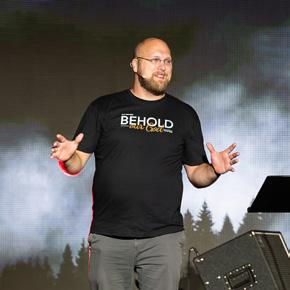
Many of you know Jesus. But you’re invited today and every day to put your trust in him and to live by faith. We never graduate from needing to hear the gospel proclaimed and from beholding the revelation of the glory of God. Today, tomorrow, next week, next month, next year—each day is a day to put your trust in Jesus and to live with repentance and faith. As Martin Luther would remind us, the whole Christian life is to be one of repentance of faith (Martin Luther, 95 Theses).
And while the glory of God is displayed through his creation, it is most clearly seen not through sunrises or in his handiwork, but ultimately in his Messiah, Jesus the Christ! And that’s not just a Nathan Olson idea; it’s what Isaiah says a little earlier in a parallel chapter. Isaiah 9:2 says, “The people who walked in darkness have seen a great light; those who dwelt in a land of deep darkness, on them has light shone.”
How does that take place? Just keep reading—Isaiah tells you. “For to us a child is born, to us a son is given; and the government shall be upon his shoulder, and his
Here’s the picture of what life looks like as we put our faith in Jesus. Paul writes in Ephesians 5:8, “For you were once darkness, but now you are light in the Lord. Walk as children of light.” Life is different now. In Christ, you’re given a new identity, a new heart, a new calling—to “proclaim the excellencies of him who called you out of darkness into his marvelous light” (I Peter 2:8).
My prayer for you is that the Lord would be faithful to do a miraculous work in your heart: to cause you to behold the glory of God—Jesus the Messiah—and to believe; and that the Holy Spirit would allow you by faith to shine his light to the world!
Olson, who spoke at the opening session of the FLY Convention, is a faculty member at the Free Lutheran Bible College and Seminary, Plymouth, Minn.
WORKSHOPS VOCATION

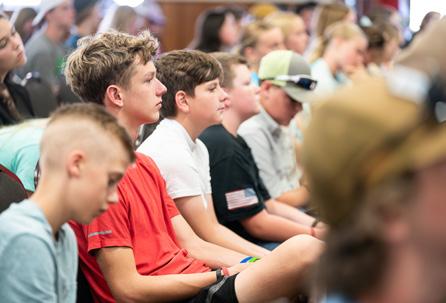
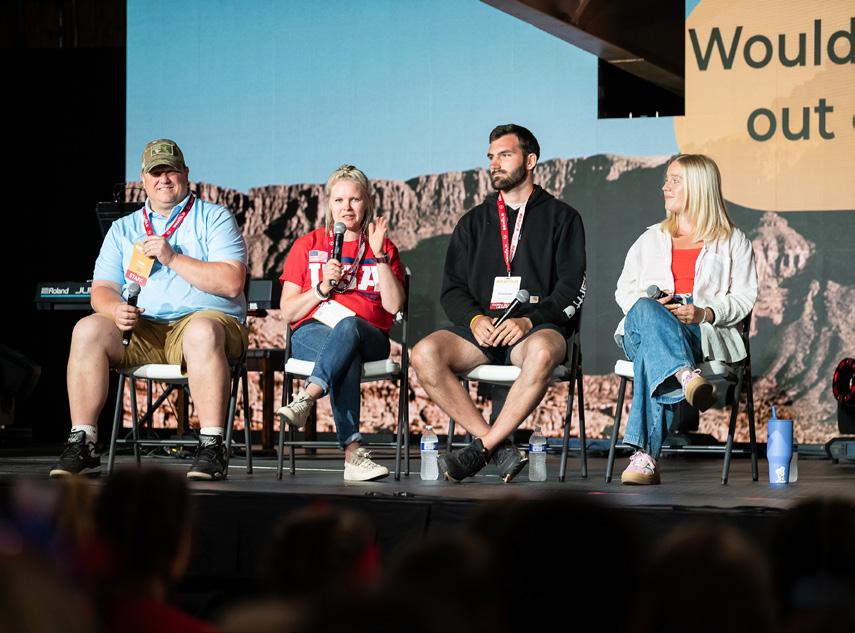
God’s calling, or vocation, refers to the unique purpose and path God has for each person’s life. At its core, vocation means “calling,” and it encompasses more than just a job—it reflects a life lived in response to God’s will and love.

After hearing testimonies from four individuals with varying lifestyles, I have come to realize that God created us uniquely. God has a plan for every one of us. Martin Luther taught that every believer has multiple callings—not just in the church, but also in family, work, and community. These roles are not pathways to earn salvation but opportunities to express faith through love and service. Vocation is grounded in grace, because we are justified by faith alone and then freed to serve.
Whether as a parent, teacher, farmer, or student, each task done in faith becomes a sacred calling. As for me and many of my peers, we are called to be faithful in our education as students. Even if algebra equations don’t make sense, or our English essays have multiple errors, we have
By Lily Bostaph
to try our best in school—it’s where we absorb knowledge to better our futures and others’. God works through our ordinary lives to bless the world.
No matter what troubles or areas of life you find yourself in, it’s important to remember that God has a greater plan, and we are called to a life of worship, prayer, faith, and fellowship in Christ. Throughout the 2025 Fly Convention, the importance of understanding vocations helped us teens to prepare ourselves not only for our futures in Christ but also to reevaluate our perspectives on the lives we are currently living. Whether you’re flying fighter jets, cutting people’s hair, changing a diaper, or cleaning windows, God gives us opportunities to reflect on his love and compassion so that we can share it. After grasping what vocations are and hearing examples of how we respond to them, I put my trust in God and will embrace my calling no matter where God places me.
Bostaph is a member of Ruthfred Lutheran, Bethel Park, Pa.
By Gideon Boe
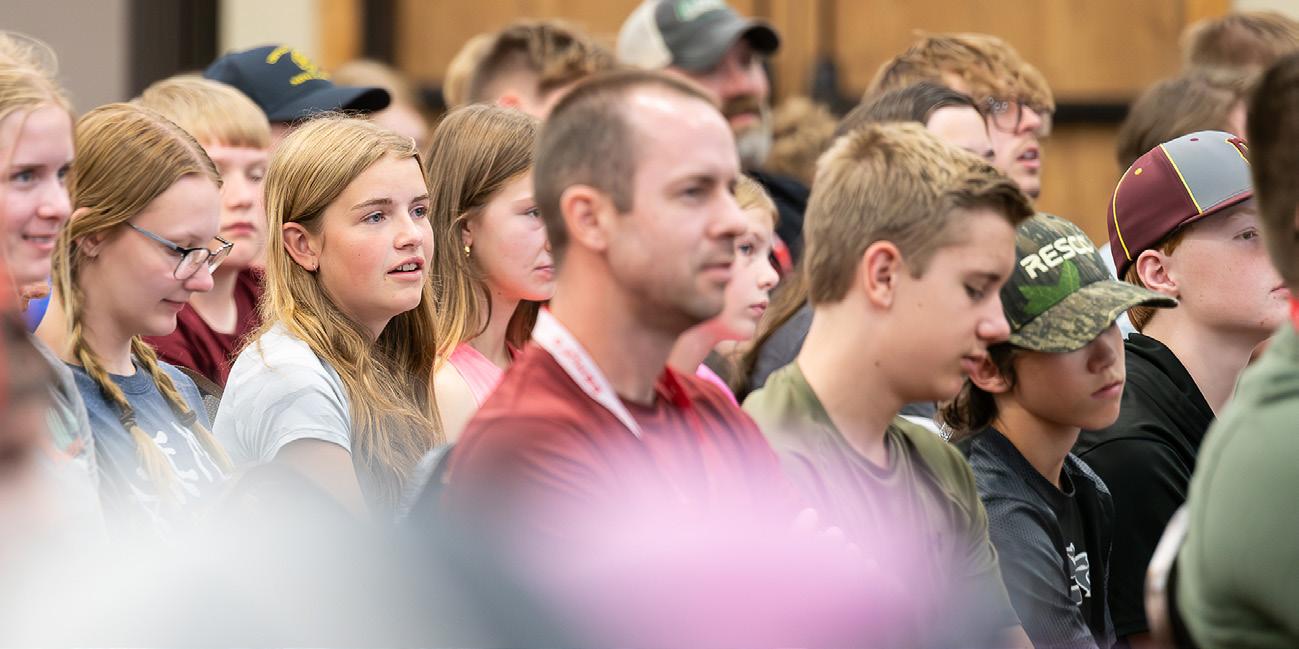
SHARD QUESTIONS
If God is good,why is life so hard?

ometimes, it takes a lot of faith to believe in the midst of confusion. We can’t often see the purpose of a trial when we are in its belly, but we can find ourselves looking back on how God has used those times in our lives to work for good. Tiger McLuen held a workshop at FLY this year where he presented on the question, “If God is good, why is life so hard?” He gave us encouragement but also his story. He had battled a severe heart condition from the early days of his youth ministry and had endured surgeries, ambulance rides, and being near death’s door more than once. But he stood before us, in defiance of despair, and was a living witness to the power of Christ to preserve life even in chaos.
The problem of evil or pain is something that we all wrestle with. McLuen knows that this question (if God is good, why is life so hard?) is one that hurting people ask, so he approached it as more of a cry for help than a philosophical musing. He asked one of the students in the audience to crush an empty can and then a full can when the empty one proved too easy. The student squeezed the can with all his strength, but it didn’t give. He used this to show that our attention shouldn’t focus on why life is so hard but on whether we are empty or filled with Christ. He read from Matthew 7, pointing us to the Foundation. A wise man builds his house upon the Rock; he is prepared for the storm.
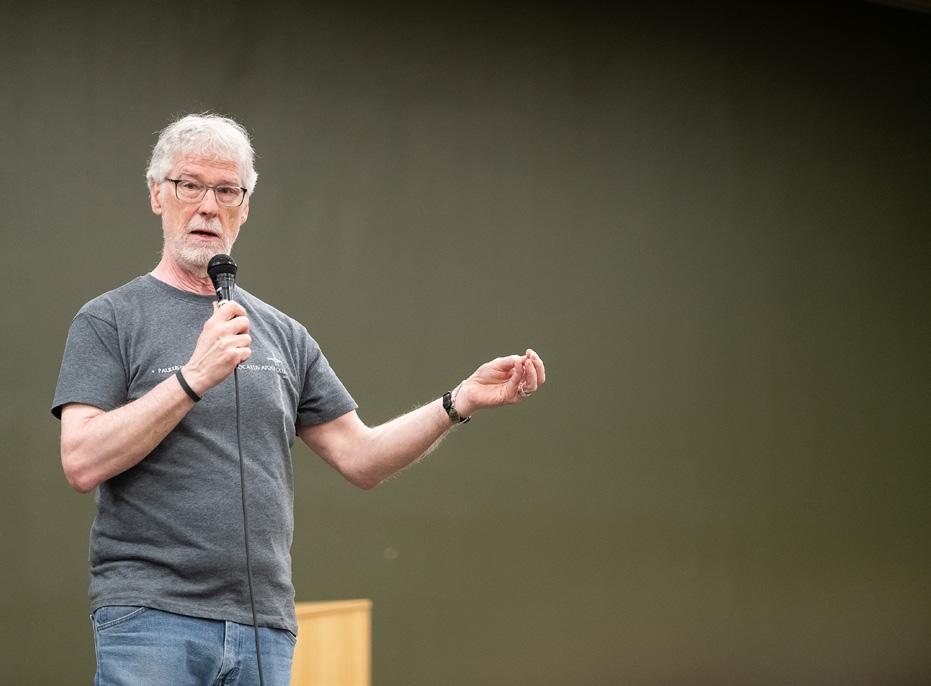
McLuen applied this practically to doubts and questions, pointing us towards the church and Scriptures for confidence when we are tired and shaken. We can’t understand everything about God, but that doesn’t mean we can’t know him. It reminded me of how Christ actually meets us in mystery or confusion. Communion with Jesus himself is found within the mystery of the Last Supper, the Eucharist, where he physically comes to meet us in the elements of bread and wine. We can have assurance, even amid confusion, if we allow God to be God and trust him. This session was a great encouragement to me, and it helped me to think more deeply about doubts, questions, and living through hard times. But more than that, hearing his story was inspiring and left me with a greater trust in God’s provision for his sheep. Be filled with Christ, McLuen taught us, and you will be uncrushable.
Boe is a member of Solid Rock Free Lutheran, Anoka, Minn.

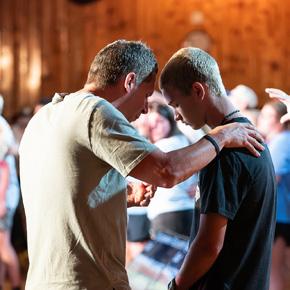
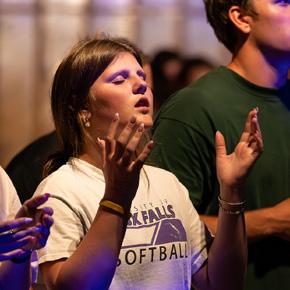
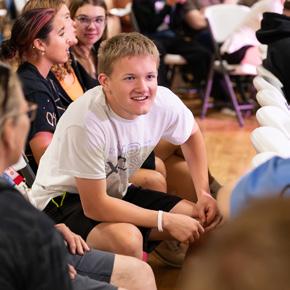


By Lydia Carr
WHEN THE MOUNTAINS DIDN’T MOVE THEM
“
It’s just really awesome that everyone here has something in common.”
One of my students said this at the opening session of the FLY Convention this year. That quote captures why FLY is so special to so many teens and adults. I attended the Free Lutheran Bible College during the COVID years and missed out on going to FLY with the summer vacation Bible school teams. God, in his goodness, brought many of us from the class of ’21 back as leaders. But while it’s great to reconnect with old classmates, professors, pastors, and friends, that’s not why we come to FLY.
As youth leaders, we want our students to connect with other believers their age, but more importantly, to deeply connect with their Creator. My prayer going into FLY was that my students wouldn’t just have fun, but that they would truly behold God. Surrounded by fellow believers, towering mountains, and sound biblical teaching, the opportunities are ripe for connection. Still, it’s easy to get caught up in the highs of the week and miss what matters most.
I brought a small group of seven students, which allowed me to check in with each of them throughout the week. As the days went on, I started hearing the same kinds of responses:
“I need to try harder.”
“I need to be better.”
While I respected their desire to grow, my heart ached at the burden they were carrying. Without true heart transformation,

trying harder becomes exhausting. Behavior change won’t last or satisfy. I gently pushed back, but I knew I couldn’t change their hearts. That is God’s job.
Dr. Nathan Olson said on the first night, “Nature functions to give us a sense of wonder about God.” It’s easy to see what he meant in the middle of the Rocky Mountains. I hoped a sunrise hike might help shift some perspective, so I invited any of my students who were willing to join me Thursday morning. They all agreed, and I was excited to have a genuine mountaintop experience with my group.
In true camp fashion, we didn’t go to bed until midnight, and we were up at 3:55 a.m. Two students accidentally slept in, and one nearly got sick on the way up. Not exactly the awe-filled mountaintop moment I had envisioned.
We went through the rest of the day as normal, but I felt defeated. I wanted my students to see God—but I couldn’t make it happen. I wanted them to know that life with God isn’t about trying harder or doing better. I wanted them to know Jesus like I know him. Without heart change, it’s just behavior management, and that kind of “faith” burns out fast. That evening, just minutes before our nightly session, I sat on a bench and cried. I was tired, overwhelmed, and unsure how to lead youth group night. All I could pray was, “Please help me, God.” Then I dried my tears and went to meet up with my students.
That night, Pastor Eric Westlake preached on John 11:38–44, where Jesus raises Lazarus. He described three states in the story:
First, Lazarus is dead.
Second, Lazarus is alive.
Third, Lazarus is free of his grave clothes.
At the end, he invited anyone who didn’t know Jesus (was spiritually dead) to come forward for prayer. He also called out to those who knew Jesus but were still living under the weight of sin (in their grave clothes). I knew this message was exactly what some of my students needed. I prayed fervently. But not a single one of them went forward.
At that point, I didn’t know what else to say.
And yet—that’s when the Lord moved.
That night, something shifted. My youth group experienced a real breakthrough—not because of anything I said, but because God was working. My students let their walls down, not just with each other, but with Jesus. They saw God in one another’s honesty. They began to behold him.
Sometimes, we encounter God on a mountaintop. Other times, we experience him in quiet, honest moments with the people he created.
Carr is the youth leader at Bethany Lutheran Church, Astoria, Ore.

INTERNALIZING SCRIPTURE
By Alex Monseth
Ibet I can read your mind. Ready? At some point in the last month, you have thought, “I should read my Bible more.”
Am I right?
Gearing up to read God’s Word can often feel less like heading out for ice cream and more like scheduling your next visit to the dentist. We know we should enjoy it, but if we’re honest, we would really rather be doing something else. This was on our mind as a FLY Committee when we were planning the 2025 FLY Convention for the many teens who came to Estes Park this past July. Enter Keith Ferrin.
Ferrin is the author of the book How To Enjoy Reading Your Bible. He has spoken at our Free Lutheran Bible College and various AFLC churches in the past and agreed to be our morning workshop speaker each morning of FLY. His goal is to get the church to enjoy reading God’s Word, because in getting to know the Word, we get to know God. He writes, “My goal is simple: to help you enjoy the Bible. That’s it. If you enjoy it, you will read it more. If you enjoy it, you will talk about it. If you enjoy it, you will be more consistent in your time with God.”
Ferrin taught our students a Bible reading method called “Scripture internalization,” which has changed how he himself reads the Bible in his adulthood. He will take a book of the Bible and read it aloud every day for a month or so until he feels that he knows it very well. He calls this “soaking” in God’s Word. Over time, the words become internalized, and he finds he knows entire books of the Bible from memory.
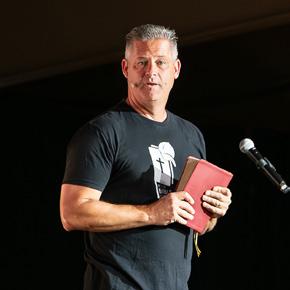
One morning at FLY, Ferrin shared the entire Book of Jonah, proceeding then to teach the students important truths about our God and the Christian life from the book. His recitation was far more than just rote memorization. He spoke it as someone telling a dramatic story, incorporating the emotional arc that Jonah likely experienced as these events happened. He had internalized the Word of God. Ferrin has also internalized Philippians, Galatians, John, and other sections of the Word. The listeners were inspired, myself included.
When I first heard Ferrin speak a few years ago, I wanted to put one of my favorite chapters of the Bible into my heart: Romans 8. I began adding a verse every day, reading through and reciting the chapter over and over again as I delivered
paint for work during the afternoons of my years in seminary. After tackling Romans 8, I expanded my goal to add Romans 7. Then Romans 6. Then Romans 5. I found that the chapters built upon each other. I spoke aloud these portions of Scripture regularly and found not only the words connecting, but also the tone within their context of the letter coming to life. Having started with the end in mind, Romans 8 began to fill with color as the preceding chapters reinforced or contrasted the life in the Spirit against the life without him. Before I knew it, a year and a half later, I had internalized Romans 1–8. These chapters have now become one of my greatest treasures. They comfort me, convict me, and spur me on in my walk with Christ. They come to my mind first when I am struggling. They are present when I am confessing sin or absolving the sins of another. “Friend, there is therefore now no condemnation for those who are in Christ Jesus! For the law of the Spirit of life has set you free in Christ Jesus!” These are God’s words, living and active by the Spirit dwelling in me.
This past February, I had the chance to share Romans 1–8 as the sermon on Sunday morning at Hope Lutheran Church in Minneapolis. It fittingly takes about 25 to 30 minutes to speak through in its entirety. It was my favorite sermon I have ever preached, and our congregation was so encouraged by the richness and power of the gospel within those living lines Paul wrote to Rome by the Spirit of God so many years ago.
What would it look like for you to start soaking in Scripture more? Start with your favorite portion of the Bible. Immerse yourself in it regularly. Read it on good days and hard days. Read when you are tired and when you are ready to take on the world. I heard from so many students who were so excited to get home from FLY and start reading aloud through the letters of Philippians or James or Ephesians every single day. I started reading through II Timothy each evening. It’s enjoyable, and I look forward to it after we get the kids to bed. If the goal was to get all of us at FLY to enjoy reading our Bibles, Keith Ferrin did excellent work.
Monseth, who is serving his seminary internship at Good Shepherd Lutheran, Brainerd, Minn., was the first vice president of the 2025 FLY Committee.

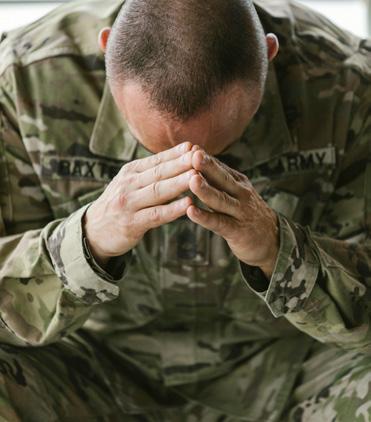
Members of the AFLC Coordinating Committee restructured the leadership of AFLC Chaplaincy this spring. In March, they voted to replace the former structure of a Chaplaincy Board and directors of Institutional, Military, and Police/Fire/EMS with a three-member Board of Chaplaincy. Those three members were appointed by the Coordinating Committee during subsequent meetings in April and May. Those members include:
• John Amundson: Police, Fire
• John Eidsmoe: Military
• David Peterson: Institutional
Eidsmoe is the military chaplaincy representative on the Board of Chaplaincy. He can be contacted at eidsmoeja@juno.com or by phone at (334) 324–1812.
BY COL. JOHN EIDSMOE
uring the dark days of World War I (1914–18), many British soldiers faced life and death in the trenches feeling alone, abandoned, and afraid. In response, a dedicated group of British military veterans called the Army Scripture Readers volunteered their time to bring God’s Word to the rank and file of the British armed forces. They worked with the chaplains, passed out gospel literature, distributed Bibles, prayed with soldiers, visited the sick and wounded, preached the good news of Jesus Christ, and even brought the gospel to captured prisoners. They often slept in the mud with the soldiers and carried the wounded to safety.
Lutherans recognize military service as a civic duty and an honorable profession. As the Augsburg Confession states in Article XVI, “... Christians may without sin occupy civil offices or serve as princes and judges, tender decisions and pass sentence according to imperial and other existing laws, punish evildoers with the sword, engage in just wars, serve as soldiers, buy and sell, take required oaths, possess property, be married, etc.”
Lutherans have served honorably and fought bravely in our nation’s wars, and Lutheran chaplains have courageously come alongside them. We in the AFLC have supported many fine military chaplains in the past. But with the retirements of Chaplains Tim Skramstad, Mark Antal, Craig Benson, and myself, we currently have no military chaplains.
My prayer is that we of the AFLC will see ourselves in the tradition of these Army Scripture Readers, come alongside our armed forces, and bring them the good news of the Word of God.
Chaplains are today’s prophets who speak God’s words of truth, counsel, and courage to the men and women our country has entrusted into their care. Military chaplains are faithful spiritual shepherds to both young recruits and seasoned leaders. They are a moral compass, pointing soldiers to God’s Word and to the Savior, Jesus Christ. Military chaplains remind their troops that many of the challenges they face each day are spiritual battles that only God himself can win for them.
Besides active-duty chaplaincy, many chaplains serve with the active reserves and with the national and state guards, often while also serving churches. And for laypersons interested in military service, there are plenty of opportunities for chaplain assistants. Anyone who is interested in military chaplaincy is invited to contact me.
Let us continue to uphold all military chaplains—active duty, reserve, guard, and retired—and let us pray that God will inspire new men of God to serve. Let us also pray daily for God’s protection, provision, and peace upon all those of the AFLC who are serving in the Armed Forces today and for their families.
Finally, will you commit to praying for God’s call upon our young men and our current seminary students and pastors to serve as military chaplains? The fields are white for harvest, and the rewards are great!
BY MARIAN CHRISTOPHERSON
ith a purpose to see the Word of Christ dwelling richly in teens, 31 writers from across the AFLC contributed to a new Christ-centered devotional published recently by Ambassador Publications. Alive in Christ: 31 Days in the Word is a collaborative project between AFLC Parish Education and AFLC Youth Ministries. Thanks to a generous donor, more than 800 youth and youth leaders who attended the Free Lutheran Youth (FLY) Convention in July were gifted a copy of the new devotional booklet.
Will Hanka, a senior who attends Hope Lutheran, Minneapolis, comments on one of the devotional readings: “I was encouraged by this book by the second lesson that I read. The Scripture was Titus 3:3–7, which says that we are justified by Christ’s grace, not because of works done by us. This was really encouraging to be reminded of because it often seems like I should now have it all together after a whole week at a Bible camp. Yet I am still a sinner. More importantly though, I am a redeemed child of God. The commentary for this passage said, ‘Now, even when we mess up, God looks at us and sees the righteousness of Christ instead of our sin.’ What a wonderful truth. Praise be to God!”
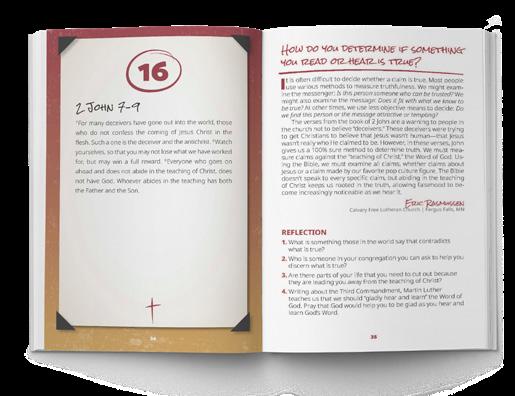
Ben Mobley, 15, a member of Solid Rock Free Lutheran, Anoka, Minn., shared what he likes about Alive in Christ: “I have found the devotional to be great because all the writers are different people from the AFLC. Personally knowing some of the writers is cool, and I love hearing them share the gospel in their own way.”
Besides spiritual enrichment, the format of Alive in Christ may help youth develop a pattern for daily devotional life:
• Bible reading: a short Scripture passage
• Meditation: devotional thoughts on the Scripture passage
• Reflection: questions and comments to help apply the Scripture to my life
• Journaling: personal responses to further process and reinforce biblical truth
• Prayer: praising and thanking God, telling him my needs, confessing my sin, and asking for help to follow and obey him
Though Alive in Christ is geared toward teens, adults can benefit from the devotional, too. Copies can be purchased in our campus bookstores or ordered online at ambassadorpublications.org/store for $5 each.
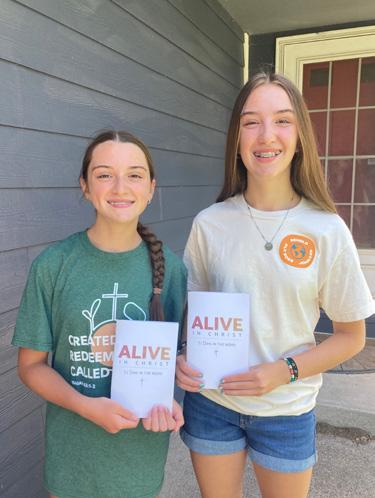
“I like that it’s written by people that I know,” said Lizzie McKenzie.
“I like that it encourages me to spend more time in the Word,” said Emma McKenzie.
Here are practical ways to use the Alive in Christ devotional:
• Personal or family devotions.
• Small group, youth group, or discipleship group discussion.
• Give the booklet to friends and family to share God’s Word and God’s desire for their lives.
• Mail the devotional to students away at college to encourage them in Christ.
• Provide copies for members of a sports team, drama club, or music group you have connections with in a high school or college in your community. Show hospitality by inviting them into your home and sharing a brief devotional time.
Christopherson is the director of AFLC Parish Education.
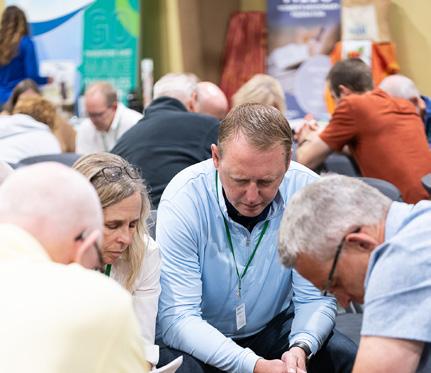
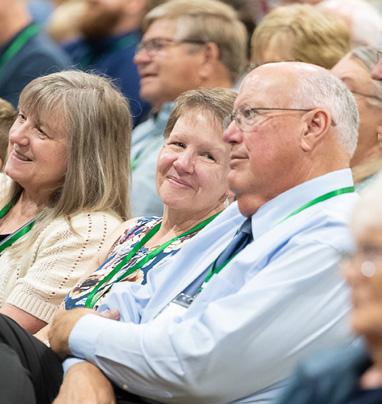
7. A free congregation gladly accepts the mutual assistance which congregations can give one another in the work for the advancement of the Kingdom of God.
8. Such assistance consists partly in the mutual sharings of spiritual gifts among the congregations through conferences, exchange visits, lay activities, etc., whereby congregations are mutually edified, and partly in the voluntary and Spirit-prompted cooperation of congregations for the accomplishing of such tasks as exceed the ability of the individual congregation.
9. Among such tasks may be mentioned specifically the training of pastors, distribution of Bibles and other Christian literature, home missions, foreign missions, Jewish missions, deaconess homes, children’s homes and other work of mercy.
Hjermstad, a member of Grace Free Lutheran, Maple Grove, Minn., is the president of the AFLC.
BY PASTOR MICAH HJERMSTAD
he AFLC Fundamental Principle no. 8 is the second of three principles that outline the interdependence of the congregation. According to these foundational principles that guide the AFLC, freedom doesn’t mean that we don’t need each other or couldn’t benefit from the gifts that God gives to other people and congregations.
I love that. Think about this with me. We ought not isolate ourselves in the name of autonomy. Instead, our freedom ought to unite us to work together in a shared mission.
Fundamental Principles 7–9 explain this concept and suggest several ways that congregations can work together for “mutual edification.” One of the suggested ideas in Fundamental Principle 8 is “exchange visits.” For many years, AFLC congregations had the practice of hosting special meetings or evangelistic meetings. They would ask another pastor to come and preach at a series of services, usually for several continuous evenings, where neighbors and others in the community would be invited. Oftentimes, those services would have a very evangelistic emphasis.
Many congregations still practice this, or something similar. When I was serving in parish ministry, one of my call letters articulated that I was free to be away from the congregation for two weeks every year to preach or teach in another congregation. However, speaking broadly, this is a tradition that seems to be fading away and falling into disuse. There are many reasons for this that we could speculate, but my primary purpose in bringing this up is to encourage congregations to consider that even if some of those older models don’t translate to your current community or culture, there’s still value in looking for creative ways to offer or receive assistance.
Many congregations still find value in that traditional, special meetings model. If that’s your congregation, continue that practice and encourage it in your community. If your pastor is invited to speak at such an event, give him freedom to accept at least a few of those requests every year. Pastors are gifts to the congregation, and they are gifts that are good to share!
Some congregations have tweaked that model and instead host weekend seminars or Bible conference-type sessions. They find that model is easier for people to commit to than every night for most of a week. But if that model is not practical in your setting, there are many other ways to exercise this idea. Participate in a Lenten rotation with other district churches. Many people enjoy hearing from other area pastors, especially in unique settings like the Lenten season. Explore ways that you can help nearby congregations without a pastor, especially if you have an abundance of preachers in your congregation. This could even be a way to give more experience to a layman who is interested in preaching or future pastoral ministry.
And it doesn’t have to be just pastoral ministry. Some of our congregations share pianists; others send lay leaders out to encourage and train other lay leaders. There are lots of ways for congregations to exchange gifts for the edification of others.
Consider how your congregation could help another. Conversely, are there needs that you have that another congregation could help with? Working together for the Kingdom like this unites us in our freedom and shares the life that God has given to his Church.

BY KIRK RAUTIO
s I await the arrival of more than 400 individuals for ARC Family Camp 2025, I can’t help but reflect on how incredibly blessed I am to still serve as the executive director of the Association Retreat Center (ARC). This season has been marked by blessing upon blessing. God has called his people to support the ARC, and they have responded in force.
Each year, we continue to improve our facilities. One exciting update is the reclamation of the building called Gaza, which we are now using for youth meetings. We plan to upgrade it into a four-season building within the next year. This is just one of many recent additions to our campus. As we continue to reclaim more buildings and reduce our debt, we can continue and expand our ministry.
Looking ahead, we have a vision to restore even more spaces, should the Lord allow. We plan to add two pickleball courts, and we hope to reclaim the old apartment building, which already has potential guests lined up for multiple retreats each year. Replacing bunk beds throughout the property and adding air conditioning to more buildings also remains a priority. Remodeling and expanding the Manna Inn will be a tremendous blessing, and the remodeling of the Tabernacle is another exciting goal. We pray that God will continue to guide us to the projects that need to be done according to what he has planned.
There is a growing network of called and like-minded individuals who are willing to assist in funding overhead costs, and they have enabled us thus far to keep the cost of the ARC winter youth retreats to $100/student and summer youth retreats at $255/student. Because we are called, however, to enable as many young people as possible to hear the Word and be healed, trained, and equipped through it, we have a goal to reduce the cost of camp for youth to less than $50/student for our winter retreats and $100/student for our summer retreats. Please pray for this funding to grow and that, if we receive it, God’s people would be open to the call to arms.
A Personal Reflection
On a personal note, I had a humbling experience this summer that reminded me why I am so grateful for this calling. Over the years, I’ve heard encouraging words like “good job” or “you’re doing great,” and those comments are always uplifting. But early this summer, I was deeply moved by a Burmese pastor following their retreat at the ARC. With the intensity, sincerity, and wisdom of a grandfather, he looked me in the eye and asked if I understood how clearly the light of Jesus shines through Ruth and me.
“I see Jesus through you,” he said.
I was floored. Never in my life did I imagine someone would say such a thing about me. I feel too broken, my past too dark, to reflect something so holy. He must have sensed my doubt, because he continued, “It’s not what you do for your guests. It’s how you do it—and what you say as you do it.”
I share this not to elevate myself, but as a reminder and encouragement: brothers and sisters, people are watching. Be vigilant, be humble, and shine the light of Jesus brightly even when you feel like you are nothing more than an ember. Allow Christ and Christ alone to shine.
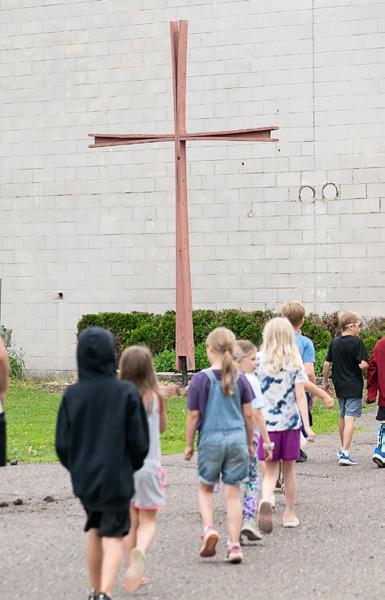
More photos from FLY 2025



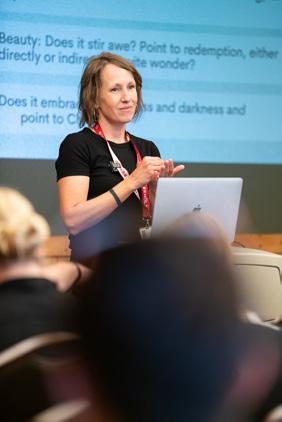




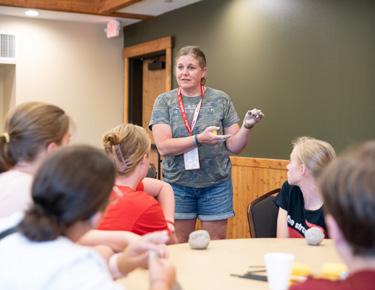
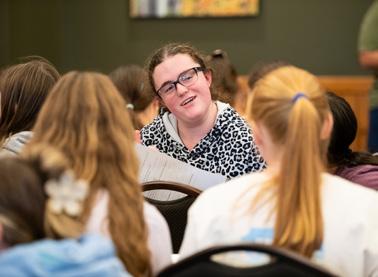
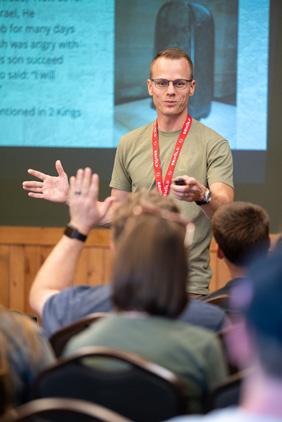
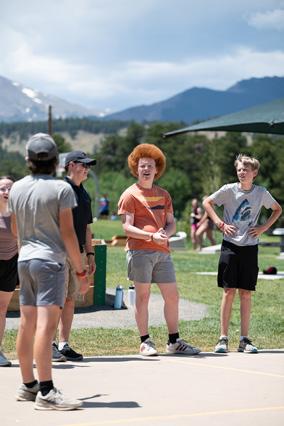
Pribbenow leads plenary session at Summer Institute
The Summer Institute of Theology was held Aug. 4–8 on the campus of the Free Lutheran Bible College and Seminary, Plymouth, Minn. The week-long theology and ministry lecture series featured a plenary session led by Dr. Brad Pribbenow on “Praying the Psalms with Jesus.” Pribbenow is the dean, chief academic officer, and professor of Old Testament studies at the Lutheran Brethren Seminary, Fergus Falls, Minn. He authored the Prayerbook of Christ: Dietrich Bonhoeffer’s Christological Interpretation of the Psalms
Pastor Sam Wellumson, who serves Christ the King Free Lutheran in East Grand Forks, Minn., taught a series of lectures on “Law and Gospel Preaching.” Other lecture options during the week featured FLBCS faculty, including “Studies in Hebrews” with Dr. Jarrod Hylden, “Who Do People Say That I Am? Studies in Christology” with Dr. James Molstre, and “Truth, Meaning, and the Gospel in the Writings of C.S. Lewis” with Dr. Wade Mobley.
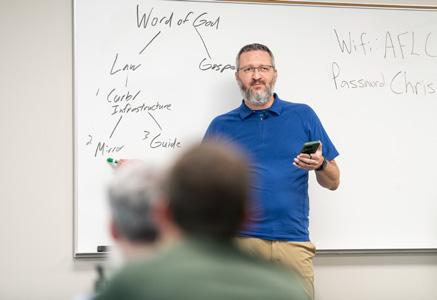
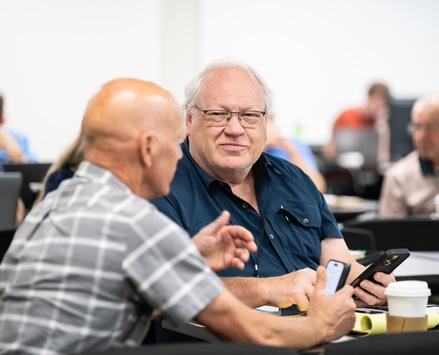
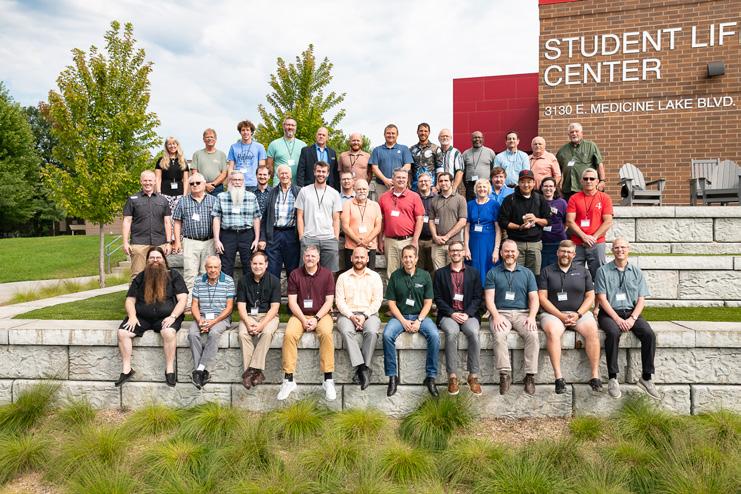
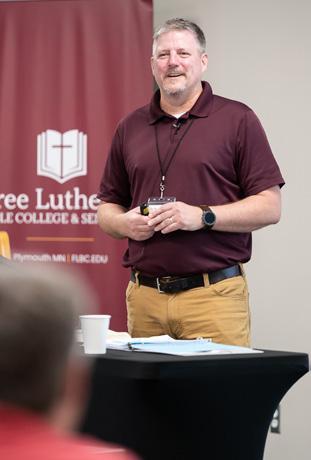
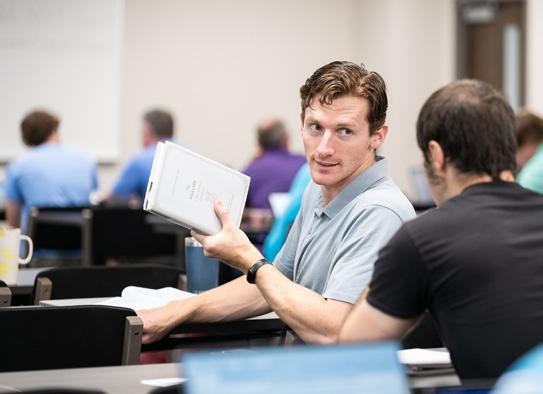
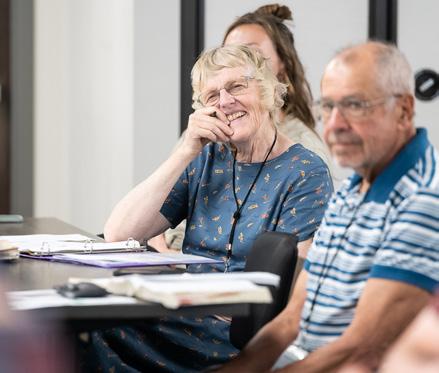
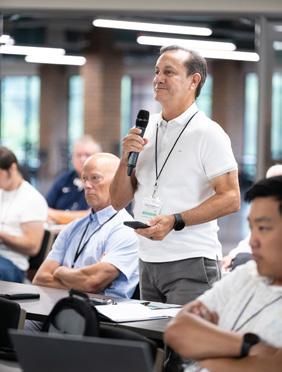
CLOCKWISE FROM TOP: Participants and lecturers at the 2025 Summer Institute of Theology. Seminarian Aaron Arneson talks about the Psalms during a session break. Pastor Hector Hiraldo-Sosa comments during a lecture on the Psalms. Josie Pillman reacts to a fellow classmate’s comment. Pastor Mark Molstre and Pastor Jon Wellumson discuss a question in class. Pastor Sam Wellumson talks about one use of the law of God. Dr. Brad Pribbenow leads a lecture on the Psalms.
PEOPLE & PLACES
Pastor Gary Jorgenson is serving as interim pastor at Calvary Free Lutheran, Fergus Falls, Minn.
Pastor Troy Hanson, a 2025 Free Lutheran Seminary graduate, was installed Aug. 10 at Skrefsrud Lutheran, Beresford, S.D., with Pastor Kirk Thorson, who serves Living Word Free Lutheran, Sioux Falls, S.D., officiating.
Pastor Alex Woodworth has resigned from Helmar Lutheran, Newark, Ill., and has accepted a call to serve Ebenezer Lutheran, Northwood, N.D., beginning in September.
Pastor Greg Schram, who serves Lutheran Church of Hope, Loveland, Colo., has retired.

Do you have a story to share?
The Lutheran Ambassador is looking for six people to share their testimonies of how God has been at work in their lives. The testimonies will be published in the November issue, with a focus on Thanksgiving. Interested? Please contact us by email at luthamb@aflc.org by Sept. 15.
JULY MEMORIALS
FLBCS
Carol Wright
Dennis Strand
Ruth Claus
Jeffrey Dahl
General Fund
Hilman Knudsvig
Home Missions
James Larson
PACCT
Karla Kennedy
Shirley Darlene Jackson, 89, of Mora, Minn., died July 21, 2025. Born Feb. 13, 1936, she was the daughter of George and Ethel (Thorson) Bonnallie. She married Harvey Jackson on Aug. 5, 1961. He preceded her in death. She grew up on a small farmstead on the Minnesota-Iowa border near Lyle, Minn., where she attended Lyle High School, graduating in 1954. She attended the Lutheran Bible Institute (LBI) in Minneapolis, where she met Harvey. She spent a year serving a church in Iowa as a ministry assistant. She attended Luther College in Nebraska, earning a degree in accounting in 1959. After marriage, they moved to Minneapolis, where she worked as an administrative assistant for the Billy Graham Evangelistic Association. After ordination, they served Bethesda Lutheran of Strandquist and Salem of rural Stephen, Minn. From 1968 to 1975, they served Salem Lutheran of Dalbo and Siloa, near Braham. They served seven congregations in Minnesota, Michigan, and North Dakota, including Hope Free Lutheran, Ishpeming, Mich., and Zoar Lutheran, Hatton, N.D. They were volunteers with and served on the boards of the Lutheran Evangelistic Movement (LEM) and World Mission Prayer League (WMPL). They retired in 2002 to Park River, N.D. After Harvey died in 2015, she made new friends in senior living in Enderlin, N.D., and at Eastwood in Mora. Surviving are three children, Linda (James) Johnson, Mora, Minn., Bradley (Carla) Jackson, Edina, Minn., and Beth (Tom) Olson, Enderlin, N.D.; fifteen grandchildren; and nineteen great-grandchildren.
A service was held July 26 at Hamilton Funeral Homes–Akkerman Chapel, Mora, with Pastor Tom Olson and Pastor Jim Johnson officiating. Burial was in Park River Memorial Park Cemetery, Park River, N.D. Memorials are suggested to Gideons International and the Lutheran Evangelistic Movement (LEM).
Dr. Oliver Blosser, 82, of Buffalo, Minn., died July 24, 2025. Born Jan. 15, 1943, he was the son of Raymond and Gertrude Blosser.
He received a Master of Divinity from Concordia Theological Seminary, as well as an MDiv and PhD in Hebrew from the University of Wisconsin, Madison. Blosser served congregations in Wisconsin and Minnesota and was a seminary professor, serving as adjunct professor of Hebrew at the Free Lutheran Seminary.
Surviving are his wife of 53 years, Mary; three children, Elizabeth, John (Emily) Blosser, and James (Hannah) Blosser; and nine grandchildren.
The service was held Aug. 6 at Buffalo Evangelical Covenant Church, Buffalo.
Parish Education
Jeff Hill
Gloria Lee
Helen Knutson
WMF
Carol Wright
Helen Knutson
Rhoda Messner
World Missions
Helen Knutson
Hilman Knudsvig


BY CLARA GUNDERSON
“Come and dine,” the Master calleth, “come and dine.” There is plenty at God’s table all the time. He who fed the multitude, turned the water into wine, to the hungry calleth now, “Come and dine.”
am sitting at God’s banquet table! The King himself invited me. “I’m not dressed properly,” I cried. “I can’t come in these rags.” But with a look of love, he changed my rags into a white robe. Taking my hand, he led me to my place. The table was laden with everything imaginable to satisfy my thirst and hunger. First, forgiveness was passed to me, and I eagerly accepted it. Then I shared it with my neighbor. We rejoiced together in the mercy and grace of our Host. I reached for the healing offered me and heard Jesus say, “Freely, freely, you have received; freely, freely, give.” My glance found my neighbor, and the Spirit worked in our hearts. There is a banner overhead with the word “love” on it. The door to the banquet hall is opened wide, and the hosts of heaven are ushering in all those whose robes are white. Soft music is heard, and I recognize the hymn, “Just as I am, without one plea, But that Thy blood was shed for me, and that Thou bid’st me come to Thee, O Lamb of God, I come, I come.” Then, as with one voice, we break into praise: “Praise God, from whom all blessings flow!”
IAbundance is what I hope you recognize in the above vignette. Abundance
of God’s love, grace, sustenance, joy, and praise.
The Scriptures themselves express the concept of abundance using such words as forever, always, continuously, satisfying, high as the heavens, from east to west, and overflowing; it’s also expressed in a negative form: I will never leave you. What could express the abundance of God more than John 3:16? “For God so loved the world that he gave his only begotten Son, that whoever believes in him shall have everlasting life.” Jesus demonstrated the scope of his care at the wedding in Cana, changing water into such a fine wine that even the steward was amazed. And think of the feedings of the multitudes when baskets full of leftovers were collected. Abundance, indeed!
At our Annual Conference in June, John 10:10 was the theme: “… I came so that they would have life, and have it abundantly.” Each time it was read, I couldn’t help thinking about my dad. I was with him pretty much full-time in his last years of life. One of the presenters at the conference pointed out how we could have a mindset of scarcity or abundance, and I recognized that Dad’s mindset was one of scarcity. He never rested his effort to provide for himself. A self-educated electrician, he provided well for his family, too, but was hard-pressed to see that it was the Lord’s provision. We talked about it, he and I. Our outlook on life was so different. Dick and I had committed our lives to work in missions and ministry. In doing so, we had to depend on the Lord’s
abundance each day. Dad thought that missionaries were (in his own words) “just gallivanting around the world.” Putting ourselves in the Lord’s hands just didn’t click with him. Over the years, though, we rubbed off on him. One Christmas I crossstitched a sampler with John 10:10 on it for him, and he hung it on his wall! Dad wasn’t an unbeliever, but he was caught up in the burden of living—which happens to all of us, doesn’t it? When Mom died, he was a very bitter man for several days. Then the Lord spoke to him, demonstrating the abundance of his love for Mom, and Dad’s heart was healed.
The story in the Bible of the widow who gave “all she had to live on” makes me think that this wasn’t the first time she did so. I think she’d feasted at God’s table before! On the other hand, the disciples seemed to have learned nothing from the miracle of the feeding of the multitudes. As they set out in a boat to go to the other side, they realized they only had one loaf of bread, and they began discussing it among themselves. Jesus chided them: “Haven’t you learned anything?”
Have we? Do we recognize God’s abundance each day?
With his manna he doth feed And supplies our every need; Oh, tis sweet to sup with Jesus all the time! “Come and dine,” the Master calls to the hungry, “come and dine!”
Gunderson lives in Coeur d’Alene, Idaho.
BUILDING THE BASE \\\ THE LORD’S PRAYER \ Part 5
BY PASTOR NICK SCHULTZ
And lead us not into temptation.
hen I was in high school, I earned my private pilot certificate.
One of the requirements of this license is to learn how to navigate and to plan and execute a long cross-country flight. I remember my instructor telling me how a small course deviation at the beginning of the flight, if left uncorrected, can lead to all sorts of trouble. For example, if you take off from Rapid City, S.D., and fly to Minneapolis and you are only 10 degrees from your intended route, you will end up close to Brainerd, Minn., nearly 130 miles away! (Funny note: To figure this out you must use the trigonometry function called sin(θ).)
In one respect, our Christian walk is not much different than this. The AFLC’s Ministerial Acts for Baptism states, “We believe that God gives the gift of faith in baptism, but that this gift will be lost unless the child is taught the Word of God…”
Our faith, created in us by the work of the Holy Spirit, is subject to attack. The devil, the world, and our own sinful nature
constantly try to push us off course. At times, these attacks are acute, and we can point to moments in time when people have either endured these attacks or they have shipwrecked someone’s faith. Often, however, these attacks come subtly to make us slowly drift away from Christ and our salvation in him.
Jesus teaches us to pray in this way, not because God tempts us, but because God leads us away from temptation. We pray that the devil, the world, and our sinful nature would not push us off course—that our faith in and love for Jesus would not be left untended but would be ever renewed. We also pray that God would keep us from temptation and sin.
How does God renew us and keep us from temptation and sin?
First, he does this by providing us with his Word and Spirit. Through the Word of God, the Holy Spirit continually calls, gathers, enlightens, sanctifies, and keeps the entire Church, including individual believers, in the one true faith. Through the Word of God, the Holy Spirit daily and richly forgives all our sins. He does this not
only through the hearing and reading of the Word of God but also through the water included in God’s command and combined with God’s Word in baptism, through the absolution proclaimed over sinners who confess their sin while believing in the forgiveness Christ proclaims, and through the body and blood of Christ distributed during the Lord’s Supper.
He also provides us with the gift of prayer. The second commandment teaches us that we should call upon God’s name in every time of trouble. Prayer is a confession of weakness—admitting that God is the only one capable of addressing the situation. That is why Martin Luther writes in the Large Catechism, “There is no help or comfort except to run here, take hold of the Lord’s Prayer, and speak to God from the heart like this: ‘Dear Father, You have asked me to pray. Don’t let me fall because of temptations.’”
Schultz serves St. Olaf Lutheran, Chamberlain, S.D., and Pukwana Free Lutheran, Pukwana, S.D.
